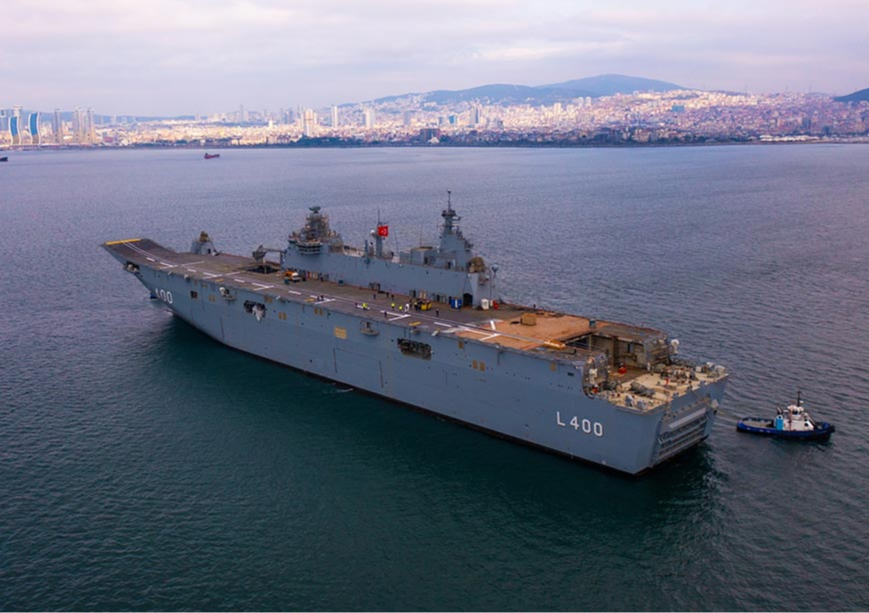-
CENTRES
Progammes & Centres
Location
Türkiye current outreach and aspirations in the Indian Ocean are largely opportunistic rather than part of a grand strategy

If the geopolitics competition during the Cold War was centred on Europe and the Atlantic, today it centres on the Indo-Pacific. Indeed, it is the Indian Ocean that is witnessing the most profound transformation. This is unfolding against the backdrop of what is now taken as an axiomatic multipolar world. In this complex environment, several non-traditional actors in the Indian Ocean are quickly making inroads. Foremost is Türkiye, a rising middle power located at the meeting point of Asia and Europe. With Black, Aegean, and Mediterranean Sea coasts, Türkiye is by no means a natural maritime power in the Indian Ocean, but it aspires to become one. Indeed, it wishes to be a truly global actor, and Ankara’s sights are clearly set on the Indian Ocean. Is this some opportunistic and aspirational neo-Ottoman theatre or a strategic power play by a capable regional newcomer? The answer, we believe, lies somewhere in the middle as to whether Türkiye’s capabilities can match its intent to emerge as an important maritime actor in the region.
With Black, Aegean, and Mediterranean Sea coasts, Türkiye is by no means a natural maritime power in the Indian Ocean, but it aspires to become one.
The most visible tool of Türkiye’s foreign policy push into the Indian Ocean resulted from the navy has undergone significant modernisation and expansion since the turn of the century. While the prioritisation of the navy was driven by greater investment, it was also part of Türkiye’s foreign policy moves that aimed to establish greater connectivity and influence in areas—maritime and terrestrial—to the south and east of Türkiye.
The clearest manifestation of this is Türkiye’s ‘Mavi Vatan’ or Blue Homeland doctrine, a maritime strategy that asserts Turkish sovereignty and interests in its maritime near abroad. First introduced in 2006, Mavi Vatan provides the ‘legal, diplomatic, financial and political’ basis for Türkiye’s claim to an expanded maritime jurisdiction and has become increasingly popular amongst both Türkiye’s political elite and the strategic community. To flex its new naval muscles, Ankara has held the Blue Homeland naval exercise series since 2019, which features over 100 ships and aircraft and has been conducted simultaneously in the Black, Aegean, and Mediterranean Seas.
Its defence sector also saw similar modernisation initiatives which produced a variety of niche weaponry that included the popular Baykar Makina-made Bayraktar TB2 unmanned aerial vehicle (UAV) or drone, armoured vehicles, and the world’s first drone aircraft carrier. Türkiye’s defence articles have, in turn, assisted its outreach and engagement with Central Asia, the Middle East, and Sub-Saharan Africa. This has come in the form of defence sales and a number of defence agreements that range from defence industry tie-ups with the United Arab Emirates (UAE) to military training with Djibouti to a recently signed maritime defence pact with Somalia. In the latter, Ankara will reportedly provide both training and equipment to Somalia’s naval force.
Türkiye’s defence articles have, in turn, assisted its outreach and engagement with Central Asia, the Middle East, and Sub-Saharan Africa.
These agreements are interesting because the signatories are all Indian Ocean littoral states, however, they represent sonly a snapshot of what Türkiye is now doing there. Türkiye’s decision to sell TB2 drones to Maldives and its expanded defence ties with Malaysia in the form of Kuala Lumpur’s procurement of Turkish Ada-class or Littoral Mission Ship (LMS) Batch 2 corvettes are other examples of Ankara’s growing influence in and around the Indian subcontinent. Türkiye has also stepped up naval cooperation with Pakistan. Not only have the two navies conducted joint naval exercises—with Türkiye being a regular participant at the Pakistan Navy-hosted biennial AMAN exercise—but Ankara also sold four modified Babur-class corvettes to Islamabad in 2023. This was significant in that it involved the transfer of sensitive technologies and intellectual property rights and could significantly bolster the Pakistan Navy’s military capabilities in the Indian Ocean. It also gave greater impetus toTürkiye’s far-reaching MILGEM project—a national warship programme that aspires to develop and build versatile naval vessels such as corvettes, frigates, and destroyers, capable of various tasks like reconnaissance and anti-submarine warfare.
Contextually, the Indian Ocean seems to be the next piece in Turkey’s aspirational puzzle to extend its remit and influence. In terms of policies, the 2023 National Foreign Policy document titled “Century of Türkiye” highlights the strategic importance of the Indian Ocean with reference to Türkiye’s “security of energy and supply chains.” It also lays out the case for Türkiye’s membership in the Indian Ocean Rim Association (IORA), which was approved in 2018.
The Indian Ocean was mentioned as far back as 2015’s Turkish Naval Forces Strategy as an area of “strategic importance.” The strategy also stated that Türkiye aimed to improve interoperability by “acquiring logistic bases and local port facilities.” To that end, albeit unrelated to these policy documents, Türkiye’s Albayrak company has operated and expanded the port of Mogadishu since 2013 and recently signed an extension agreement for another 14-year concession. Another Turkish company, Favori LLC, opened a new terminal in 2015 and continues to operate Mogadishu’s international airport. Türkiye opened a military training facility for Somalia’s military and special forces in Mogadishu in 2017. It had reportedly trained thousands of soldiers as well as 5,000 commandoes, 316 officers, and 392 NCOs by 2022. A more controversial 2017 agreement with the former government of Sudan for the restoration of an Ottoman-era outpost in Suakin on the Red Sea led to speculation that the work was a cover-up for a naval dock and resupply facilities.
Reference to Türkiye’s Ottoman past inevitably leads to questions about whether Türkiye’s new-found interest in the Indian Ocean is simply nostalgia for a remembered past that has been simply translated into opportunistic policies. After all, the Ottoman sultans did send naval expeditions to the Indian Ocean as far as the Strait of Malacca, supported the Muslim Adal Sultanate in present-day Somaliland in its conflicts with neighbouring, largely Christian Ethiopia, and fought naval battles against the Portuguese in the Red Sea during the Ottoman-Portuguese conflicts (1538-1560).
A more controversial 2017 agreement with the former government of Sudan for the restoration of an Ottoman-era outpost in Suakin on the Red Sea led to speculation that the work was a cover-up for a naval dock and resupply facilities.
Describing Türkiye’s blue-water aspirations as neo-Ottoman is too simplistic. There are long-term interests informed by role conceptions at play when President Recep Tayyip Erdoğan described Türkiye’s national interest as “residing in the Suez Canal, the adjacent seas, and from there extending to the Indian Ocean.” Aspirational as they may be, Türkiye has never been comfortable with its limited role. Since 1923 and the beginning of the Republic, Türkiye’s leaders—right across the political spectrum, from Kemalists to Islamists to nationalists—have, to varying degrees, articulated a desire to see Türkiye play a bigger role, first in its near-abroad and then to build on that in ever-widening concentric circles.
The problem faced by Ankara’s leaders, whether in the 1970s or the 1990s, was that they lacked the national power to operationalise these foreign policies consistently. Like Türkiye’s Mavi Vatan maritime strategy, Türkiye now has the possibility of turning on-paper aspirations into active foreign policies, albeit with limits. Its engagement with states in Central Asia, West Africa, and the Indian Ocean basin should be understood from this perspective. These actions share only two factors associated with the former Ottoman Empire: a very partial geographic remit, and the belief of Ankara’s current political elite in Türkiye’s natural role as transcending the nation-state. But where the Ottomans were interested in territorial control, Türkiye’s current leaders are not.
Türkiye has made its intentions of engaging with the Indian Ocean region clear, but what form will its engagement take, and can it pull it off? Despite Ankara’s mobilisation of pan-Islamic language and anti-colonial rhetoric, Türkiye’s engagements in the region have been mainly commercial in nature and non-alerting. Even selling drones to the Maldives or Ankara’s involvement in the Pakistan Navy’s modernisation is largely motivated by commercial interests as Ankara looks to expand its burgeoning defence industry rather than strategic goals aimed at sideling India or becoming a resident power in the western Indian Ocean. Indeed, Cem Gürdeniz, the architect of Türkiye’s blue homeland strategy, when justifying the Turkish Navy’s presence in the distant Indian Ocean, spoke only about the country's “business interests.”
The problem faced by Ankara’s leaders, whether in the 1970s or the 1990s, was that they lacked the national power to operationalise these foreign policies consistently.
Türkiye’s own capabilities—akin to all states—remain limited. This places significant constraints on Ankara’s ability to redeploy forces to project power in regions that are far from home. Türkiye’s own security burdens at home and nearby mean that its resources are primarily meant to defend the homeland rather than engage in extra-regional military adventurism. Even if it wanted to, Türkiye’s navy does not possess the resources for significant and impactful deployments to far-off waters.
Türkiye's current outreach and aspirations in the Indian Ocean may be welcomed by some and decried by others, but they remain largely opportunistic rather than part of some grand strategy. For the near term, Türkiye will play a limited role in the Indian Ocean as a host of larger actors with greater stakes in the region address challenges and produce them, too.
Rushali Saha is a New-Delhi-based independent researcher focusing on Indian-Ocean geopolitics.
Brendon J. Cannon is an Assistant Professor of International Security at Khalifa University in Abu Dhabi.
The views expressed above belong to the author(s). ORF research and analyses now available on Telegram! Click here to access our curated content — blogs, longforms and interviews.

Rushali Saha is a New-Delhi-based independent researcher focusing on Indian-Ocean geopolitics. ...
Read More +
Brendon J. Cannon is Assistant Professor of International Security at Khalifa University in Abu Dhabi. His research is at the nexus of international relations security ...
Read More +